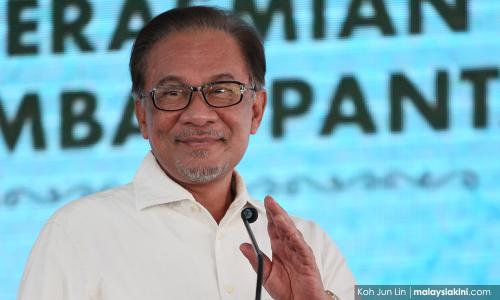Anwar's tepid endorsement of pluralism
COMMENT | The words “pluralism” and “liberal” are pejorative terms in some sectors of Islamic discourse.
One is regarded by conservative Muslims as a threat to the uniqueness and finality of their creed and the other is viewed by the same crowd as synonymous with licentiousness.
But to PKR president and MP for Port Dickson Anwar Ibrahim and Georgetown University professor John Esposito, Muslims would be in obtuse denial of the world's diversity and their religion's social teachings if they abjure pluralism and scorn ideas that are liberal and constructive.
“It will result in intellectual impoverishment,” warned Anwar, in remarks he made at a forum last night on 'Islam and Multiculturalism', and subtitled 'The need for educational reform'.
Esposito, the other speaker at the panel discussion held at the Institute for Islamic Civilisation and the Malay World (ISTAC), told a crowd of about 400 that when he informed a Malaysian friend he and Anwar were to speak at the forum, the disclosure drew a dismissive rejoinder: “Ah, two liberals.”
But Esposito was unfazed by the sneer.
“Pluralism is the key challenge in the 21st Century,” he pronounced before a crowd that wavered between scepticism about his and Anwar's confidence that multiculturalism and liberal constructs are not threats to Islam and their relish for Quranic citations by both panellists that purportedly encourage recognition of the world's cultural and ethnic diversity.
Few things delight Muslims more than hearing about the wisdom and prescience of their scripture, especially when pointed out by non-Muslims. Esposito is Roman Catholic.
But as anyone with more than cursory knowledge of Islamic scripture knows, the Quran has verses counselling serene acceptance of the world's pluralism and militant rejection of it, the later verses abrogating the earlier ones.
Neither Anwar nor Esposito appeared willing to deal with this ambivalence.
Incidentally, the forum's theme and subtitle were roomy enough to allow latitude for both panellists to hold forth, well, broadly.
Held within the ornate premises of ISTAC, an architectural structure whose columns mirror Islam's glorious past in Andalusia (the term for Moorish Spain), the construction of the building was funded by the Malaysian government in the 1990s when Anwar was the finance minister running surplus budgets.
The openness of Islamic governance in Andalusian Spain is a favourite motif in Anwar's rhetoric.
Anwar was careful not to allow his counsel on pluralism to veer into an open-ended endorsement.
Confident of the reform of faith education
He alluded to his criticism of what he called “extreme liberalism” during the Port Dickson by-election campaign last September and how it had exposed him to what he felt were unfair broadsides from liberal civil society types. The criticism still rankles him.
Anwar and Esposito were confident that reform of the system of faith education would go a long way to making Muslims bearers and, more importantly, honest practitioners of the universalist ideals of their religion.
Anwar said there was no point in Muslims being pious while being apathetic on issues of corruption and abuse of power in society.
He said reforms to the way Muslims are presently educated were imperative if piety is to be accompanied, to use a Marxian term, by praxis.
Whether these reforms envisaged the inclusion of courses on Western philosophy in the curriculum, Esposito, who spoke from notes, did not say while Anwar, speaking extempore as is his wont, favoured it but did not flesh out his position.
Finally, with respect to serene Muslim acceptance of the world's pluralism, Esposito let drop an episode that was freighted with irony.
He revealed that at a symposium on Islam - this one in America - a young Jordanian approached him to say he had heard the good professor several times before.
The solicitous man offered the thought that things were getting late in the day for what seemed like the elderly Esposito's continued deferral of the inevitable: the don's conversion to Islam. He advised that Esposito not wait too long.
Esposito related this vignette without the ironic smirk that ought to have accompanied its narration. Perhaps he wanted to be polite.
The upshot: it flew into the ether without his listener’s appreciation of the irony.
A pity, because it said some about Muslim acceptance of pluralism.
TERENCE NETTO has been a journalist for more than four decades. A sobering discovery has been that those who protest the loudest tend to replicate the faults they revile in others.
The views expressed here are those of the author/contributor and do not necessarily represent the views of Malaysiakini.
RM12.50 / month
- Unlimited access to award-winning journalism
- Comment and share your opinions on all our articles
- Gift interesting stories to your friends
- Tax deductable
